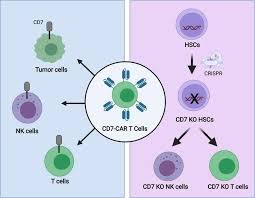Blog Post
CD7: An Important Immunoregulatory Molecule
CD7 is a transmembrane protein primarily expressed on the surface of T cells and natural killer (NK) cells. It plays a significant role in the regulation and activation of the immune response. As research continues to advance, the importance of CD7 in various immune functions and its potential as a therapeutic target in diseases such as leukemia and autoimmune disorders becomes increasingly clear.
Structure and Function of CD7
CD7, also known as GP40, is a 40 kDa glycoprotein encoded by the CD7 gene located on chromosome 17. It belongs to the immunoglobulin superfamily and contains a single extracellular immunoglobulin-like domain, a transmembrane region, and a short cytoplasmic tail. This structure enables CD7 to participate in various signaling pathways that are crucial for immune cell function.
The primary function of CD7 is to facilitate the activation and differentiation of T cells and NK cells. It is involved in the early stages of T cell development within the thymus and plays a role in the signaling processes that lead to T cell proliferation and cytokine production. CD7’s interaction with other cell surface molecules and its ability to transmit activation signals are vital for an effective immune response.
CD7 in Immune Regulation
CD7 is also implicated in the regulation of immune cell migration and adhesion. It helps guide T cells and NK cells to sites of infection or inflammation, thereby enhancing the body’s ability to respond to pathogens. Additionally, CD7’s involvement in cell-cell interactions contributes to the formation of the immunological synapse, which is essential for effective communication between immune cells and antigen-presenting cells (APCs).
Another critical aspect of CD7’s function is its role in maintaining immune homeostasis. By modulating T cell and NK cell activity, CD7 helps balance immune activation and suppression, preventing excessive immune responses that could lead to tissue damage or autoimmunity.
Clinical Implications of CD7
CD7’s expression on T cells and NK cells makes it a valuable target for therapeutic interventions, particularly in hematological malignancies and autoimmune diseases. For example, CD7-targeted therapies are being explored in the treatment of T cell acute lymphoblastic leukemia (T-ALL) and other T cell malignancies. These therapies aim to selectively target and eliminate malignant cells while sparing normal immune cells.
In autoimmune diseases, modulating CD7 activity could help restore immune tolerance and reduce inflammation. Researchers are investigating the potential of CD7 inhibitors or modulators to treat conditions such as rheumatoid arthritis, multiple sclerosis, and psoriasis.
Additionally, CD7 is being studied as a biomarker for disease diagnosis and prognosis. Abnormal CD7 expression levels have been observed in certain leukemias and lymphomas, and monitoring these levels could provide insights into disease progression and treatment response.
Research and Future Directions
Ongoing research on CD7 continues to shed light on its complex roles in immune regulation and its potential as a therapeutic target. Advances in understanding CD7’s signaling pathways and interactions with other immune molecules could lead to the development of novel treatments for cancer, autoimmune disorders, and other immune-related conditions.
In conclusion, CD7 is a crucial immunoregulatory molecule with significant implications for immune function and disease. Its roles in T cell and NK cell activation, migration, and homeostasis underscore its importance in maintaining a balanced immune response. As research progresses, CD7 holds promise as both a therapeutic target and a biomarker for various diseases.


